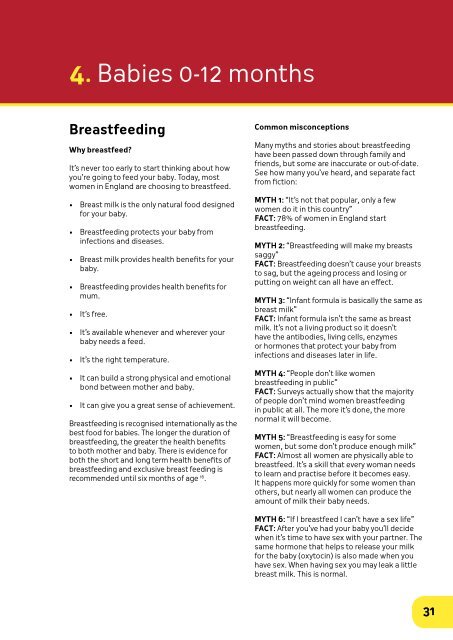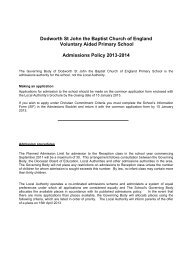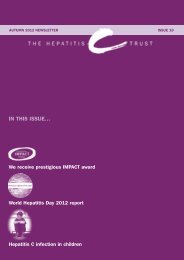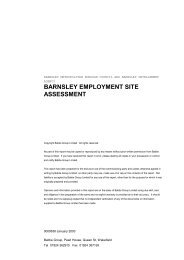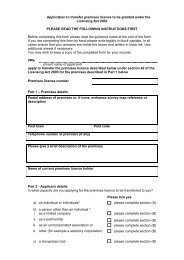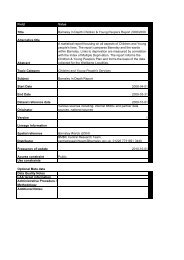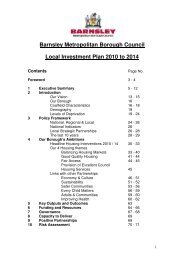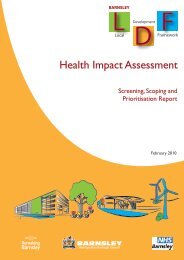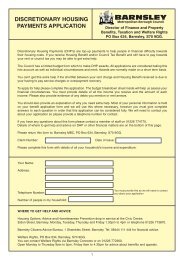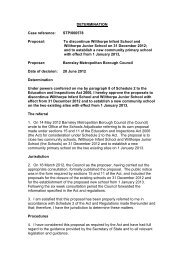Food and Nutrition Guidelines - Barnsley Council Online
Food and Nutrition Guidelines - Barnsley Council Online
Food and Nutrition Guidelines - Barnsley Council Online
Create successful ePaper yourself
Turn your PDF publications into a flip-book with our unique Google optimized e-Paper software.
4. Babies 0-12 months<br />
Breastfeeding<br />
Why breastfeed?<br />
It’s never too early to start thinking about how<br />
you’re going to feed your baby. Today, most<br />
women in Engl<strong>and</strong> are choosing to breastfeed.<br />
• Breast milk is the only natural food designed<br />
for your baby.<br />
• Breastfeeding protects your baby from<br />
infections <strong>and</strong> diseases.<br />
• Breast milk provides health benefits for your<br />
baby.<br />
• Breastfeeding provides health benefits for<br />
mum.<br />
• It’s free.<br />
• It’s available whenever <strong>and</strong> wherever your<br />
baby needs a feed.<br />
• It’s the right temperature.<br />
• It can build a strong physical <strong>and</strong> emotional<br />
bond between mother <strong>and</strong> baby.<br />
• It can give you a great sense of achievement.<br />
Breastfeeding is recognised internationally as the<br />
best food for babies. The longer the duration of<br />
breastfeeding, the greater the health benefits<br />
to both mother <strong>and</strong> baby. There is evidence for<br />
both the short <strong>and</strong> long term health benefits of<br />
breastfeeding <strong>and</strong> exclusive breast feeding is<br />
recommended until six months of age 16 .<br />
Common misconceptions<br />
Many myths <strong>and</strong> stories about breastfeeding<br />
have been passed down through family <strong>and</strong><br />
friends, but some are inaccurate or out-of-date.<br />
See how many you’ve heard, <strong>and</strong> separate fact<br />
from fiction:<br />
Myth 1: “It’s not that popular, only a few<br />
women do it in this country”<br />
Fact: 78% of women in Engl<strong>and</strong> start<br />
breastfeeding.<br />
Myth 2: “Breastfeeding will make my breasts<br />
saggy”<br />
Fact: Breastfeeding doesn’t cause your breasts<br />
to sag, but the ageing process <strong>and</strong> losing or<br />
putting on weight can all have an effect.<br />
Myth 3: “Infant formula is basically the same as<br />
breast milk”<br />
Fact: Infant formula isn’t the same as breast<br />
milk. It’s not a living product so it doesn’t<br />
have the antibodies, living cells, enzymes<br />
or hormones that protect your baby from<br />
infections <strong>and</strong> diseases later in life.<br />
Myth 4: “People don’t like women<br />
breastfeeding in public”<br />
Fact: Surveys actually show that the majority<br />
of people don’t mind women breastfeeding<br />
in public at all. The more it’s done, the more<br />
normal it will become.<br />
Myth 5: “Breastfeeding is easy for some<br />
women, but some don’t produce enough milk”<br />
Fact: Almost all women are physically able to<br />
breastfeed. It’s a skill that every woman needs<br />
to learn <strong>and</strong> practise before it becomes easy.<br />
It happens more quickly for some women than<br />
others, but nearly all women can produce the<br />
amount of milk their baby needs.<br />
Myth 6: “If I breastfeed I can’t have a sex life”<br />
Fact: After you’ve had your baby you’ll decide<br />
when it’s time to have sex with your partner. The<br />
same hormone that helps to release your milk<br />
for the baby (oxytocin) is also made when you<br />
have sex. When having sex you may leak a little<br />
breast milk. This is normal.<br />
31


